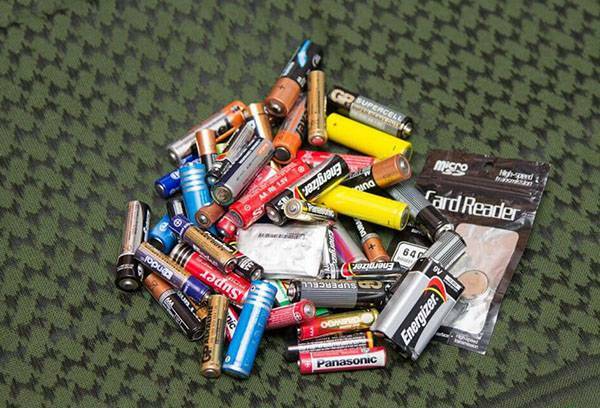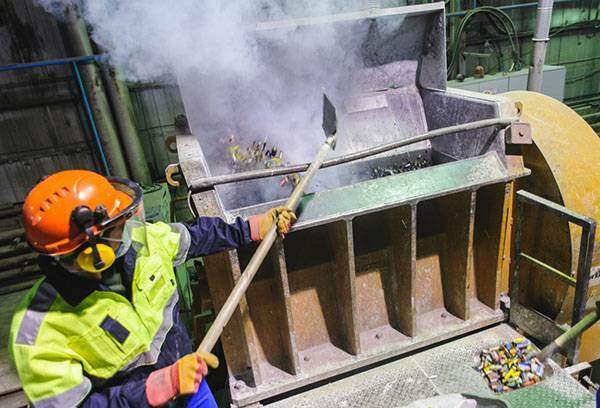Contents:
- Maybe you can stand on the sidelines?
- Are the batteries so dangerous?
- Battery Disposal in the Recent Past
- What do we have to date?
While an average European has long been aware of where to turn out the batteries and why it should be done, for an average Russian this question is still a mystery. Yes, there, many of us do not even know that batteries are not just rubbish and that they need to be recycled! If you are interested in the problem of pollution of the environment with toxic waste, we think you are ready to contribute to the preservation of our planet. And in order for the first attempt to deliver batteries for processing did not discourage the whole ecological attitude, we will provide a small educational program on this topic.

Maybe you can stand on the sidelines?
Have you ever felt the negative effects of a decomposed battery? We do not. So why not throw away the batteries? Maybe all this hype around the batteries is more voluntary than mandatory. It seems that it is precisely these reflections that incite a good portion of Russians to remain inactive.
Of course, harmful substances from batteries can be treated as waste that we merge into rivers, the exhaust gases that we breathe, the chemicals that we water the plants. All this, unfortunately, has long ago become the norm, and the human body has proved so tenacious that it can function even in such conditions. That's only in the situation with batteries in the garbage there is one important difference: this is one of the few threats to which an ordinary person can actively influence.
A simple citizen has too little weight when it comes to industrial scale, and you can not personally influence the pollution of rivers, air or food by large companies. So do not you want to take this rare opportunity and make a real contribution to the preservation of the environment, your health and the well-being of your children? Are the batteries so dangerous?
If you are familiar with the speech above, then it will be useful for you to find out exactly how the used batteries pollute the environment. I would not want to force up, but in any settlement, it is because of the illiteracy of the population that the soil, air, ground water and products grown in this area are contaminated with chemical compounds from batteries, respectively. Why does it come out this way? See for yourself. ..
- The person does not know where to put the used battery, and throws it into the trash can along with the household waste. But he is not the only one: because of ignorance or because of human laziness, tons of used batteries are sent to domestic garbage. Only in Moscow for a year about 15 million batteries accumulate in landfills, and this despite the fact that there are quite a few activists in charge of the collection, proper storage and processing of batteries.
- At the dump, the entire time bomb starts to rust, and the protective metal shell eventually breaks down under the influence of corrosion. Now only time separates dangerous heavy metals from you. Zinc, manganese, cadmium, nickel, mercury and alkalis, which until recently worked for the benefit of mankind, producing energy, penetrate into the earth and water, poisoning them. From there to your table, and then to the kidneys or liver, where these heavy metals settle, the path is fairly short.
It is interesting
It is estimated that 1 battery that has got into domestic garbage, can pollute about 20 square meters of soil and 400 liters of water.
- When garbage in a landfill is burned, the batteries, heating up, release into the atmosphere dioxins, thereby infecting the air. Take into account the water cycle in nature, and it turns out that with rain, dioxins will fall into the soil and into the groundwater. At the same time, being in the air, they move for tens of kilometers, infecting all large areas. Although, as you already understood, 100% of the clean soil, water and air is not even in some remote farmstead.
- Plants grown on contaminated water, and animals grown on contaminated plants, are on your table. In addition to this, dioxins enter the body from the air. Heavy metals settle in the organs, causing problems with the liver, kidneys, often with brain work and general well-being.
By the way. ..
Do you think that boiling eliminates water from all harmful substances? Unfortunately, it's so easy not to get rid of heavy metals.
It seems that the disposal of used batteries is still worth considering carefully, especially now you will have a chance to compare the processing in the recent past and to the present and understand that it is much easier to contribute to the preservation of the environment than it seems.

Disposing of batteries in the recent past
For sure, having become interested in the topic of sorting garbage and processing, you stumbled across the network to less recent articles, from which it can only be rendered that in Russia, with the utilization of batteries, everything is very, very bad. Let's not lie, it all happened: some people even took old batteries with them to Europe to take them to reception points. Agree, not the easiest and affordable way. But, as they say, "for want of a better" this method did not seem absurd.
- All processing enterprises that could correctly dispose of old batteries were left in Kazakhstan and Ukraine after the collapse of the Union, respectively, in Russia it was only a collection for safe storage in anticipation of export or the appearance of a processing line in the country.
- There were not so many activists at that time, and the propaganda of battery collection was conducted only in large cities, and that is not too zealous. As a result, it was not possible to collect parties sufficient to be exported abroad for processing, and all these batteries were simply stored in anticipation of their hour.
Important!
Some have been looking for an answer to the question of how to dispose of batteries at home, but without specialized equipment it is not possible.
- Even right-thinking people with an understanding of the problem simply did not know what to do with the old batteries: they should have been taken before in the local Deux, Housing Office and RGU, but even there you could have been surprised to see them. At the beginning of the 2000th campaign, the collection was conducted by IKEA, but then it had to be canceled because of the claim of Rostekhnadzor.
Interesting
Because of the decomposition characteristics, batteries can not be dropped into water or burned, for a long time activists collected and stored batteries right at home. A little later, large-scale environmental organizations organized special burials.
Given the circumstances at that time, the idea of throwing batteries into a special box in some mall in Germany during the trip no longer seems so absurd. But now things are very different with recycling.

What do we have at the moment?
You are incredibly lucky if you are interested in disposing of batteries only now, because now you can turn off the batteries in every major city in just 5 minutes, without hanging the thresholds of always rejecting the service points of reception. No more need to look for DEZs and other points, and the batteries themselves are not simply stored, but processed. And all this is not happening abroad, but with us, in Chelyabinsk.
By the way. ..
IKEA recently renewed the collection of batteries and energy-saving lamps, as evidenced by the information on their website. Boxes for collection without the need to learn anything from the staff - an ideal option for those who often happen there!
In 2013, the company MegapolisResurs, engaged in the recycling of various waste, launched a line for the recycling of batteries, household and industrial, on the line for the recycling of microcircuits. The owners say that the processing efficiency on their line is higher than at some European utilization plants, and also MegapolisResurs accepts the batch not only from all over Russia, but also from the near and far abroad.
Just a couple of years with the launch of an affiliate program they managed to make the collection and processing of batteries really affordable. Now you have a chance to hand over the batteries simply on the way to work: in the partner program there are such big companies as MTS, MegaMarket, "Auchan" and even a dozen slightly less eminent companies. It is in their branches that you can easily hand over old batteries absolutely free of charge.
Important!
Do not expect to receive money for the delivery of batteries: there is no such practice anywhere, since the recycling process is quite expensive. For legal entities, this service will even be paid! Moreover, if you decide to hand over a large batch of batteries( from 10 kg), not through partners, but directly to MegapolisResurs, then you will have to pay for their processing, no matter whether you are a company or an individual.
How is the processing carried out? Accumulators are crushed, iron is separated by a magnetic tape, and then with the help of alkaline reactions, zinc and manganese salts are isolated, as well as graphite. And it just seems like it's a matter of two minutes. One battery is recycled for about four days! Of course, for one such cycle, about 2 tons of batteries are processed, but these 2 tons must first be collected.
Interesting
One of the partners of the line, the design plant "Flacon", recently installed on its territory a vending machine in which food and drinks can be bought not for money, but for old-time finger batteries.
The problem is that battery recycling is a complex, long and expensive process, and the volume of shipments arriving at the plant is still too small to establish a line. Because of this, the batteries are still sorted manually, since the costs of switching on the automatic sorting device will be impractical. Moreover, this process can be called only conditional for the time being: only the iron received from the batteries can be sold, the volumes of the production of other substances are insufficient to interest the wholesale buyer.
It turns out that for the more efficient operation of the only processing line in the country, it is necessary to provide it with material for processing. And this means that the country's advancement in this sphere depends directly on each of us.



